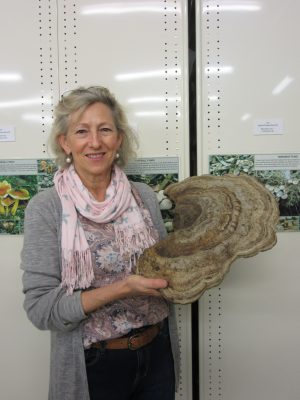Macleans College – Susan van der Spuy

2016 | Fascinating fungi: the good, the bad and the ugly
School: Macleans College
Host: Landcare Research, Auckland
Region: Auckland
Susan teaches at a large Auckland Secondary school where Junior Science programmes are in the process of being updated to reflect the Nature of Science strand. She has experience in language teaching and has a particular interest in scientific literacy. At Landcare Research she has worked alongside Fungal Scientists (Mycologists) and PhD students to learn more about fungi, both beneficial and pathogenic. This afforded a wide range of experiences from repetitive and precise plating of culture samples to the highly complex science of molecular biology and DNA sequencing.
Susan worked with mycologists and specialist lab technicians on established and developing protocols in order to culture rare fungi from soil and leaf samples as well as Kauri tree roots. She learned scientific skills and attitudes towards investigations carried out in containment areas to prevent contamination, the deep thinking around investigating and research and collaboration between scientists. A greater understanding of taxonomy came from assisting with classification in the Landcare Research Fungarium which is a national and international collection of over 20,000 fungal species. The Fungal Kingdom is larger than the Plant Kingdom and yet we still have so much to discover in understanding fungi, from the 7 km wide ‘Humungous Fungus’ in Oregon, USA to the smallest micro-organisms.
New Zealand’s unique biodiversity provides a particularly rich and relatively unknown range of species. In the interests of identifying some of these unknown fungal species, Susan worked with Landcare staff on an MBIE Unlocking Curious Minds project, involving three schools to ‘Discover New Life’. Along with scientists, teachers and students she sampled fungi in pristine native bush, assisted with culture and subculture of swabs from specimens and followed the DNA processing and sequencing processes. Susan was able to use Blast software for DNA matching and describing samples of live cultures stored in the International Collection of Microorganisms from Plants (ICMP) at – 170°C. As a result 6 potentially new species have been discovered. The involvement in participatory science provided experience of the value of citizen science projects and the MBIE Curious Minds projects in engaging students in authentic science learning and action. The schools have chosen names for the new species and Susan was able to assist with testing life processes of these fungi, information essential to publishing their detailed descriptions in a scientific paper.
A highlight for Susan and uniquely valuable learning experience was the 30th annual Fungal Foray held in Glenorchy in the South Island. She spent time with scientists from all over the world who shared their passion for fungi out in the field. She participated in fascinating discussions and scientific insights whilst plodding through dense ‘Lord of the Rings’ territory with observational skills on high alert. The generosity of these world experts and Landcare Research staff in sharing their knowledge and the collaborative networking gained from the experience was inspirational.
The practical and intellectual experiences gained by Susan enable a deepened understanding of the work of scientists, the Nature of Science and how Science is applied in the real world. She will use this understanding along with connections made outside school to enhance her ability to enrich science programmes at Macleans College, support colleagues effectively and use her passion for science to make the subject more relevant for students.
